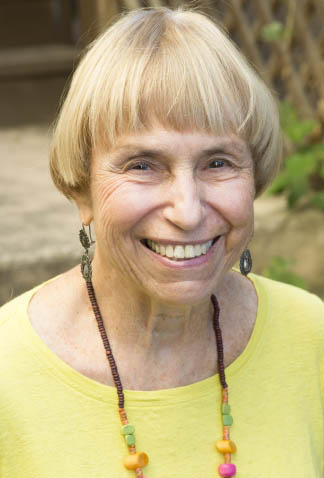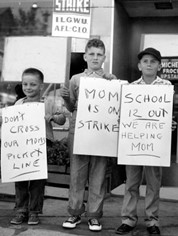|
|
|
|
The weekly newsletter of the México Solidarity Project |
|
|
|
Online at mexicosolidarityproject.org |
|
August 17, 2022/ This week's issue/ Meizhu Lui, for the editorial team |
|
|
Even Little People Face Great Big Decisions |
|
Ann Berlak, the activist educator we interview in this week’s issue, presents children with choices in her classic book for kids, Joelito's Big Decision: La Gran Decisión de Joelito.
Joelito has to decide whether to cross a picket line to get that hamburger he’s craving or stand in solidarity and go without that burger. All of us adults these days have to make that same sort of decision as we encounter picket lines at our local Starbucks. Oh my, can we ever forego that habitual morning jolt from our favorite cup o’ joe!
The decisions big and small that we so often face today come down, in the end, to “what side are you on?” Are we reinforcing our society’s driving narrative, that we have no real choice except to accept an unjust status quo? Or are we rewriting that narrative and pointing the way to an alternative world of justice?
Some years ago, at the same age 10 as Ann Berlak’s young Joelito, my son also faced a choice. My boy’s neighborhood pals had picked up some rocks and thought it’d be fun to break the windows of a church down the street. So my son had to decide. Go along with his pals or walk away. Unfortunately, my son didn’t make the right decision. He himself didn’t pick up a rock, but he did stand by silently as his friends broke the windows.
That silence equaled complicity. The court of mom sentenced him to go apologize and save up his allowance to help pay for the damage.
My ten-year-old actually had a third choice besides doing wrong or walking away. Judge mom counseled him that he could have tried to convince his pals to put down those rocks, just as Joelito’s friend convinced him to honor the picket line.
We have the job — as parents, as teachers, as members of our communities — to help the next generation reject hate, violence, and inequality and lead the way to a joyful and just world. Every day, we need to remember, we all have choices to make. |
|
|
|
Don’t miss an issue. Subscribe to the weekly México Solidarity Bulletin! |
|
|
|
|
Educating Children for Life-Long Joy and Justice |
|
Ann Berlak has been a teacher and teacher educator for over fifty years. Schools, she believes, should be places where children learn to become active creators of a more caring and equitable world. Her bilingual children’s book Joelito's Big Decision: La Gran Decisión de Joelito, beautifully illustrated by Daniel Camacho and translated by José Antonio Galloso, encourages children to consider the effects of their own decisions.
How did you come to write a children’s book focusing on a child of Mexican grape pickers? |
|
|
I found out about anti-brown racism when I taught elementary school in Goleta, California some fifty years ago. My class included the children of migrant workers who only spoke Spanish. I took for granted that I should focus on these kids who most needed my help. Joel Sanchez became one of my favorites. Joel had been homeless in México until his uncle went down from the US to find and adopt him.
A University of Santa Barbara parent then protested that I was spending too much time on the Mexicano kids, and the school principal backed her up. But I have ever since carried Joel with me in my heart.
Schools and parents use story books to teach kids to read. But will any story do?
Just to learn to read? Yes. But content matters in shaping young minds. What books we choose depends on our goals. I asked myself, what should we communicate to the next generation that will reverberate to the eleventh generation? I realized that Joel and all children need to understand that another world is possible, and that they can be part of a movement to make it happen. Shouldn’t the meaning of life and the purpose of education be to create a just and joyful future for all? |
|
Unfortunately, many of the books read in school teach kids — through the “hidden curriculum” — to accept and to reproduce the world we live in, with all its injustices. Our education system contributes to normalizing the bootstrap myth, the idea that if you just work hard, you’ll make it, or even get rich. Many migrant parents believe and reinforce that message, so children “take it for granite!” |
|
|
Photo: Prodigy |
|
The result: a population that for the most part cannot even imagine there could be a different way to organize society. We’re like the fish that can’t see they swim in water.
But what about privileged kids? How do you get them to question injustice when they’re doing just fine?
In racially and economic diverse classrooms, teachers can provoke social justice learning through the students’ sharing of their own experiences. Children are curious about each other and have an innate sense of justice. I ask them questions that prompt them to think about what they see in their everyday lives.
One example: A mother is standing at the off-ramp of interstate 580 with a baby on her shoulder asking for money to feed her child. What’s she feeling? What has brought her there? What can be done? Just a nudge, a relevant question at the right moment, can spark critical thinking. Teachers can help the fish to see the water they swim in.
But sometimes we lack diversity in the classroom. We lack a “Joelito.” I wrote the book to invite him in. Joelito tells the story of a ten-year-old boy who feels puzzled when his best friend says his family can’t afford to replace his sister’s stolen backpack. Joelito later sees that friend and his father picketing the fast-food restaurant where the father works. They’re carrying signs that shout “Low pay is not OK!” Our economic system, Joelito suddenly realizes, isn’t working fairly. What must he do? |
|
Can you give an example of how you help elementary school students understand what you call “social justice basics”?
I asked students in one class, “Who pays your teachers? Does your mom send money to school to pay the teacher every week?” Soon we were talking about what “public” education means and what taxes pay for. I knew they were getting the notion of “public” when I asked them to list all the things that should be public, and one boy said, “Wigs.” I hadn’t thought of that! Turned out his grandmother had cancer and couldn’t afford a wig. |
|
In another class, I gave students Monopoly money and asked them to allocate their “taxes” to an array of possibilities: schools, free hospitals, transportation, police, summer camp. Students then lobbied their classmates to use taxes for their own preferred projects. That gave the other students insights into various ways economic status defined their classmates’ lives.
Just about everyone, for instance, turned out to be concerned about going to college. In the third grade! But some kids didn’t have to worry about paying for college.
What kinds of discussions can Joelito facilitate? |
|
|
Photo: Catherwood Library, Cornell |
|
Joelito has been used in ESL — English as a Second Language — classes for adults. Once in a PTA meeting I was invited to, we broke into small groups that included both parents and their children. This kind of intergenerational conversation about real-life issues had not happened before in their homes.
Teachers and parents, children and librarians, all need to engage in community education together. We need to hear what children think and to challenge our own thinking, as well as theirs, if we’re going to create that just and joyful world. |
|
|
Who Actually ‘Owns’ México’s Water? |
|
Our guest columnist this week, the British economist Guy Cowman-Sharpe, has been investigating labor conditions in the Mexican state of Querétaro.
With issues of drought affecting as much as two-thirds of México’s municipalities, water protests are becoming more and more visible. Querétaro offers no exception to this trend. Local activists have been organizing daily demonstrations and sit-ins outside the state government building in Querétaro’s Plaza de Armas since March. |
|
|
Demonstrators have been protesting the ongoing issues around water provision to Cadereyta and Maconí and other communities across the state. These issues stem from a massive water infrastructure project started in 2006 to provide water to Querétaro’s booming industrial center from the springs of the Moctezuma River, 123 kilometers away.
A verbal agreement with the State Water Commission promised these communities roadworks, electrical infrastructure, and access to drinkable water to make up for the disruption caused by the project. But today, 14 years later, many people in these communities are having to walk up to three hours to access water from streams while drinkable water flows in pipes through their lands. Ten private companies in the state, meanwhile, are hoarding more than 39 million cubic meters of water per year, according to México’s National Water Commission.
Querétero’s governor since 2018 has been Luis Nava, from the rightist, neoliberal PAN party. In May, Querétero state lawmakers voted to increase the pace of including private providers in the state’s water provision. Freshwater Action Mexico, an NGO network pushing for water rights, has criticized that move on three fronts: a lack of inclusion of human rights or water justice in the proposals, the absence of a plan to deal with the climate crisis, and the use of a private-company subcontracting provision as a form of backdoor privatization. |
|
|
Recent news reports and commentaries, from progressive and mainstream media,
Nic Yeager, ‘Forget the Alamo’ Unravels a Texas History Made of Myths, or Rather, Lies, Texas Observer. Three Texan authors build on a long tradition of dissent from patriotic accounts of Texas history in a new book on the racism baked into our story of the Alamo.
John Ackerman, El renacimiento de Morena. Lo que está en juego hoy en Morena no es entonces el falso dilema entre un partido de “cuadros” o de “bases”, un asunto superado desde hace ya más de tres décadas, sino entre un partido clientelar, autoritario y tribal, al estilo del PRI y el PRD, o un partido democrático, participativo y popular, como lo prometen los documentos básicos de Morena.
México’s president proposes ban on beer brewing as drought intensifies, Financial Times. López Obrador takes aim at industry using dwindling water resources while local people suffer, blasting the business model of making alcoholic drinks with water drawn from dwindling aquifers to slake thirsts on the other side of the border.
Antonio Heras, Esclavitud moderna en los campos de México, La Jornada. Los campesinos viajan en un camión desde sus lugares de origen con un contrato de mil 500 pesos semanales. Al llegar, los mayordomos separan mujeres y hombres para otorgarles un espacio en el que cohabitan hasta con 10 personas y duermen dos en cada colchoneta.
Sarah DeVries, Why, when it comes to reproductive rights, México gives me hope, México News Daily. Some powerful people support women’s autonomy, including the Supreme Court chief justice.
SCJN reconoce legitimidad de organizaciones a defender el medio ambiente, La Coperacha. Contrario a lo esperado por ambientalistas, la Suprema Corte de Justicia de la Nación ha reconocido la legalidad del acceso a la justicia ambiental solamente a personas morales que en sus actas constitutivas así lo planteen.
AMLO Proposes a Five-Year Global Truce to Work for Development, teleSUR. México’s president is calling for a five-year international community truce to avoid military and economic wars, using the United Nations as a mechanism to monitor commitments.
De Salinas a Peña, todos los expresidentes deben ser procesados: Noroña, SinEmbargo. Un diputado del PT aseguró que es necesario convocar a una Asamblea Constituyente la cual tenga la tarea de crear un nuevo Poder Judicial, pues el sistema actual está corrompido. |
|
|
The Mexico Solidarity Project brings together activists from various socialist and left organizations and individuals committed to worker and global justice who see the 2018 election of Andrés Manuel López Obrador as president of México as a watershed moment. AMLO and his progressive Morena party aim to end generations of corruption, impoverishment, and subservience to US interests. Our Project supports not just Morena, but all Mexicans struggling for basic rights, and opposes US efforts to undermine organizing and México’s national sovereignty.
Editorial committee: Meizhu Lui, Bruce Hobson, Bill Gallegos, Sam Pizzigati, Courtney Childs, Victoria Hamlin, Agatha Hinman, Steven Hollis. To give feedback or get involved yourself, please email us! |
|
|
|
Web page and application support for the México Solidarity Project from NOVA Web Development, a democratically run, worker-owned and operated cooperative focused on developing free software tools for progressive organizations. |









